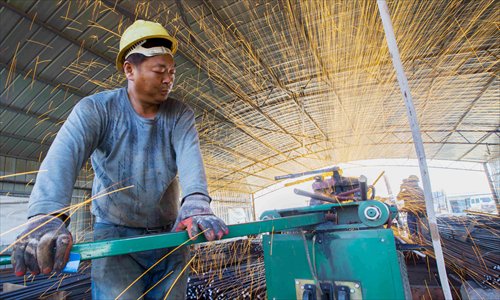CASS forecasts 6.9% GDP growth for 2015
Revenue pressure seen restricting govt spending

A man works at a construction site in Lianyungang, East China's Jiangsu Province. Photo: CFP
China's GDP growth rate in 2015 will be 6.9 percent, the Chinese Academy of Social Sciences (CASS) forecast on Monday, according to domestic media reports.
The CASS released a report at a press conference on Monday summarizing China's economic situation in 2014 and 2015, and estimating that China's annual GDP growth in 2015 will be slightly below the 7 percent target set by the Chinese government in March, domestic finance website yicai.com reported on Monday.
China's slower growth is partly down to the fact that not enough positive fiscal policies have been rolled out by the government to prop up the sluggish economy, Fu Minjie, a research fellow at the National Academy of Economic Strategy at the CASS, said at the press conference.
Zhang Ping, deputy director of the Institute of Economics at the CASS, also noted that the government's expenditure, despite showing a rising trend recently, is still "restricted" by various factors such as falling revenues and the increasing debt pressure facing local governments.
Data from the Ministry of Finance (MOF) on September 15 showed that China's general public budget revenue in August rose 6.2 percent year-on-year to 967.1 billion yuan ($152 billion), down from the 12.5 percent growth in July.
But the expenditure in August climbed 25.9 percent year-on-year to 1,284 billion yuan, according to MOF data.
Infrastructure construction has become a focus of government expenditure. The government's investment in infrastructure projects climbed 19.1 percent year-on-year in the first half of 2015, according to a statement from the National Development and Reform Commission (NDRC) on July 28.
Ding Jianping, director of the Research Center for Modern Finance at the Shanghai University of Finance and Economics, told the Global Times on Monday that China's economic prospects hinge on technical innovation, an area that currently does not offer enough promising avenues for investment.
"Neither the government nor private investors can find enough suitable innovative enterprises to put their money into," Ding said.
Ding suggested that the government could roll out more active fiscal policies in this area, such as personal income tax cuts for employees in China's technological and innovation centers such as the Zhongguancun area in Beijing.
He also said that the government should see to it that domestic companies' financing channels are "protected," an issue that has been highlighted by the wild fluctuations in mainland stock markets in recent months.
The central government has launched a series of measures to boost the economy, including cutting benchmark interest rates and banks' reserve requirement ratio (RRR), as well as unveiling guidelines for further reform of the country's State-owned enterprises on September 13.
"The reform measures taken by the government will create space for future development in the country, but the domestic economic trend in the short term still looks uncertain," Zhang noted at the press conference.
Most of the major securities firms in China also hold pessimistic views about China's economic prospects, because of factors such as slack demand in the global market and stagnant industrial production, according to a report China Everbright Securities Co sent to the Global Times on Monday.
China's industrial production climbed 6.1 percent year-on-year in August, according to a statement from the National Bureau of Statistics on September 13. But the "recovery base" for China's industrial production is still not stable, the statement said.
UBS China also said that it does not "expect GDP growth to accelerate from its current pace," in a report it sent to the Global Times on Monday.
China had a GDP growth rate of 7 percent in the first half of 2015, according to data from the NBS on July 16.
Meanwhile, the NDRC, the country's top economic planner, voiced confidence in the economy on Monday, citing signs of improved momentum and quality in the country's growth.
Economic growth remains in a reasonable range and there have been positive signals, according to a speech by Xu Shaoshi, head of the NDRC, published on the NDRC's website on Monday.